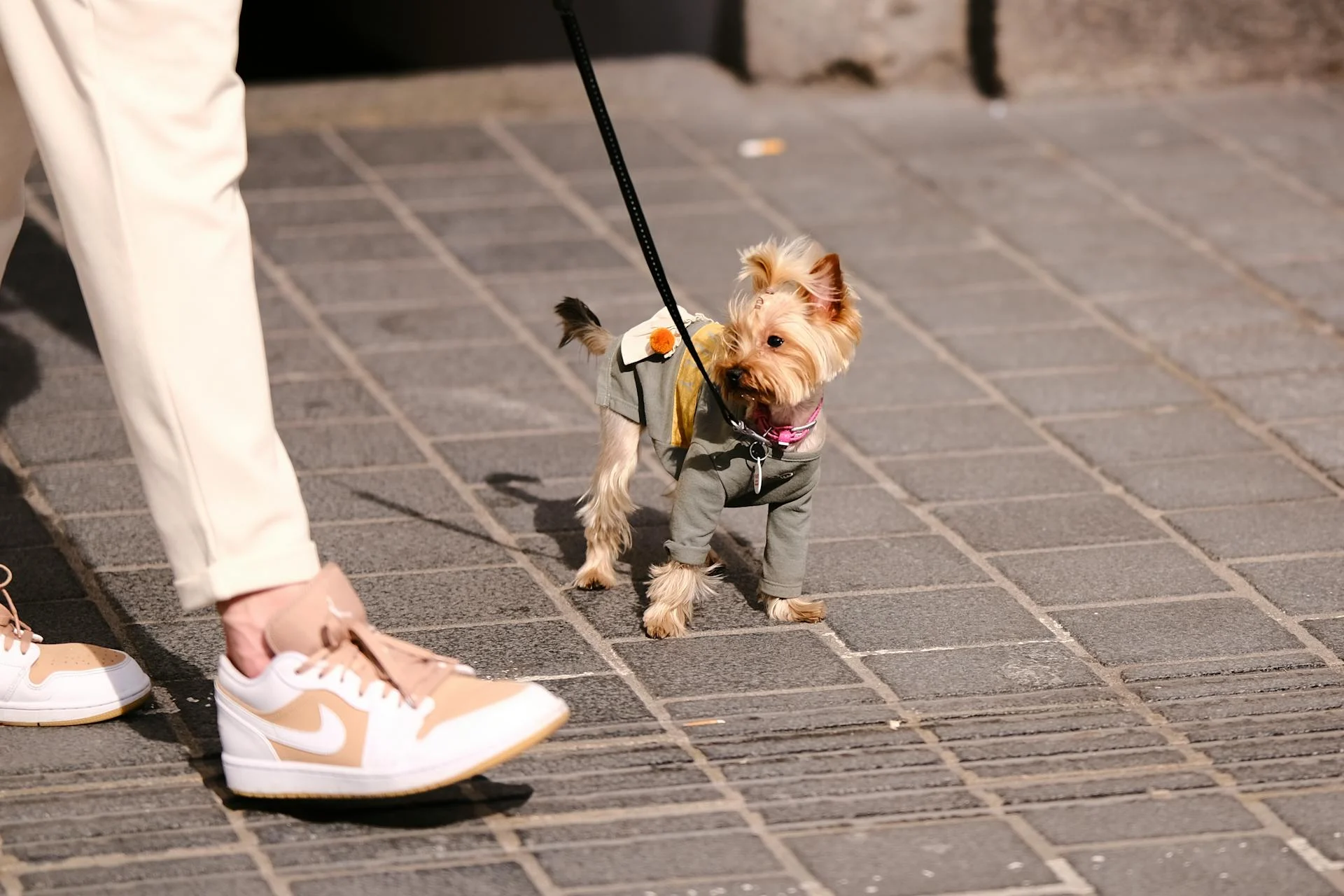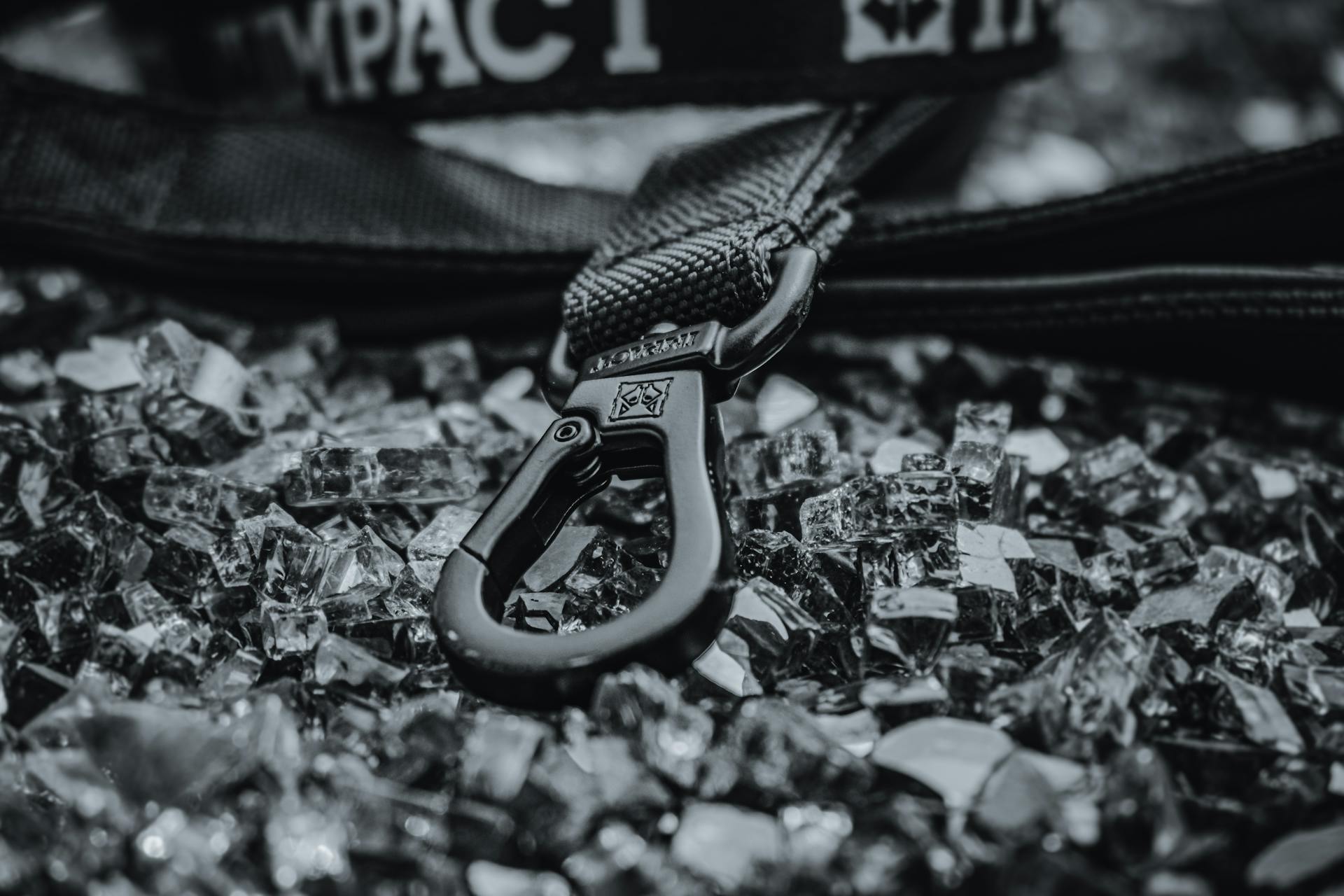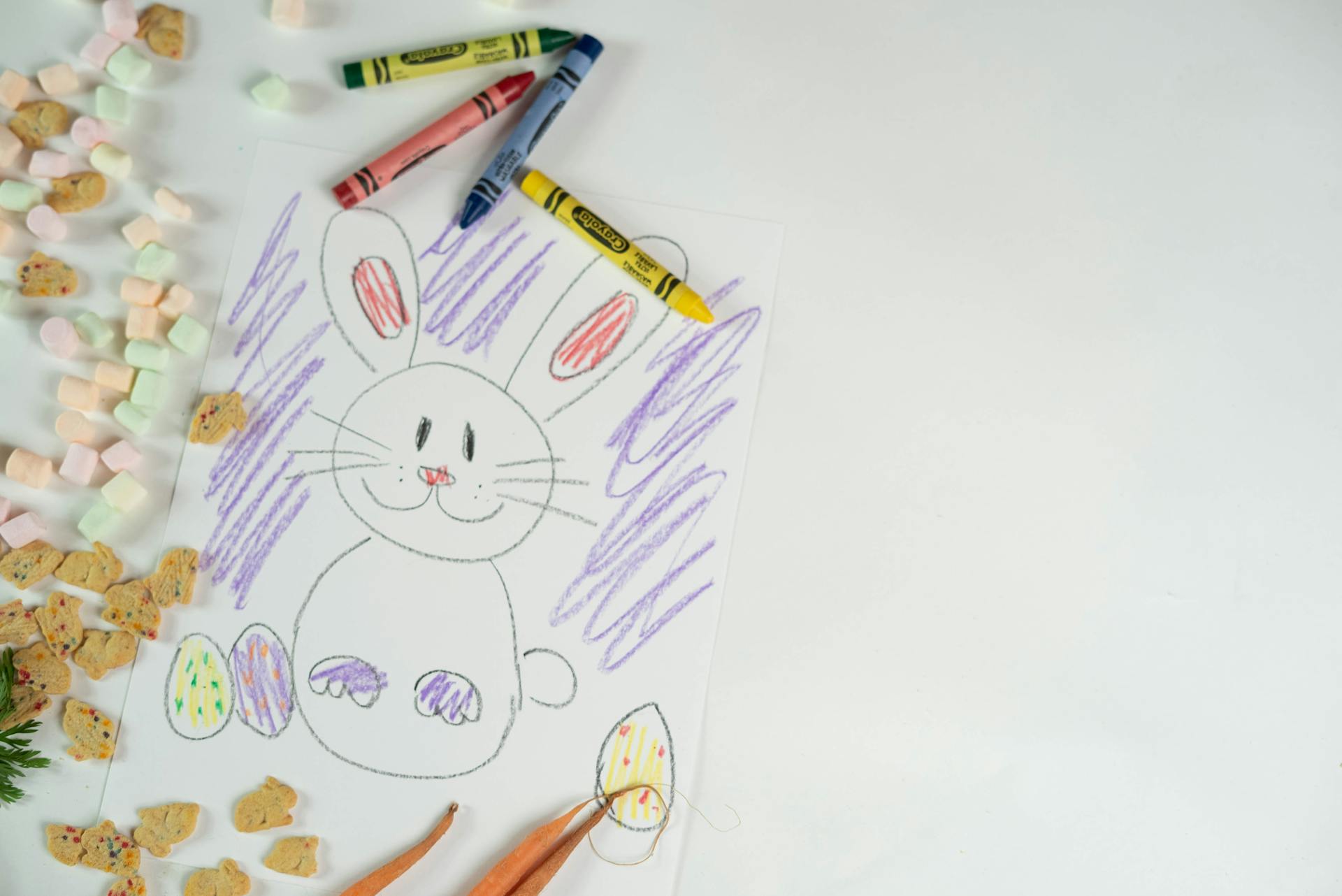
Crate training a Yorkie can be a game-changer for new pet owners. Crate training is a safe and effective way to housetrain your Yorkie, prevent destructive behavior, and give them a sense of security.
Yorkies are naturally inclined to be crate-friendly due to their small size and independent nature. This makes crate training a breeze for many owners.
The crate should be introduced gradually to prevent overwhelming your Yorkie. Start by placing treats and toys inside the crate to make it a welcoming space.
A crate that's too large can be counterproductive, so choose one that's just the right size for your Yorkie.
Benefits of Crate Training
Crate training a Yorkie can be a game-changer for both you and your furry friend. For one, it helps establish stability and independence in your Yorkie, which is especially helpful when you need to leave them at home.
Yorkies are sensitive and emotional dogs, and crate training can help prevent dominance or violence when they're upset. It's also a great way to prevent messes in the house, as Yorkies are notorious for doing what they want, and crate training teaches them to wait until you're available to take them outside.
Additional reading: Yorkies and Chihuahuas
A crate acts as a safe haven for your Yorkie, providing them with a sense of security and comfort when you're not around. You can make it feel more like home by adding their favorite toys, blankets, or something with your scent to it.
Here are some of the key benefits of crate training a Yorkie:
- Establishes stability and independence
- Prevents dominance or violence when upset
- Helps prevent messes in the house
- Acts as a safe haven for your Yorkie
By crate training your Yorkie, you can help them feel more secure and comfortable, and even make them a more loving and comforting companion.
Understanding Crate Training
Crate training a Yorkie is highly recommended by experts, especially when they're still in their puppy years. It's an essential part of raising them and helps them feel a sense of stability and independence.
Providing a crate for your Yorkie is not an act of punishment, but rather a safe place for them to relax and collect themselves. Experts wouldn't recommend it if it were considered abuse or neglect.
Leaving your Yorkie's collar on while in the crate can be dangerous, especially when you're leaving home. It's best to take it off before putting them in the crate.
Making the crate feel homey to your Yorkie is crucial. This can be done by placing extra absorbent training potty pads and adding comforting toys, blankets, etc.
Introducing your Yorkie to the crate should be done gradually and with positive reinforcement. This can be achieved by providing a command to teach them when it's time to get in the crate and giving them treats for good behavior.
Preparing for Crate Training
To begin crate training your Yorkie, it's essential to choose the right crate size. A Yorkie should have enough room to stand, turn around, and lay down comfortably.
You'll want to select a crate that's durable, comfortable, and flexible with your training needs. For example, kennel or airline-style dog crates work best for dogs that prefer to sleep in the dark.
A soft blanket or pad should be placed in the crate for your Yorkie to sleep on, and a few toys can be added to keep them entertained.
Choosing a Size
Choosing a size that's just right for your Yorkie's crate is crucial. You want to make sure it's big enough for them to stand, turn around, and lay down comfortably.
A good rule of thumb is to choose a crate that's the right size for your dog's adult size, not their current size. This will give you flexibility to add a divider as they grow.
Avoid choosing a crate that's too small, as it can make your Yorkie irritable and uncomfortable. If the crate is too big, they might neglect using it and make messes instead.
Yorkies need enough room to lie down, stretch, stand up, and turn around in their crate. A crate that's too small will not provide this space.
Intriguing read: Dog Aggression after Neuter
What Should Be Provided Inside?
To make the crate a positive place for your Yorkie, it's essential to provide the right items inside. A soft blanket or pad is a must-have for comfort.
Choose a chunkier, non-stuffed bed that's waterproof, as it's easier to clean up accidents. This type of bed will also keep your Yorkie comfortable and secure.
Toys can help alleviate boredom and stress, but be sure to choose ones that aren't delicate enough for your Yorkie to chew through. Stuffed toys are not recommended, unless they're stuffed with treats.
Securing food and water bowls to the door of the crate is a good idea, especially if your Yorkie needs to drink constantly. This way, you can ensure they always have access to what they need.
Worth a look: Dog Training with Toys
Training Your Yorkie
Training your Yorkie requires patience and consistency. It's essential to make the crate feel homey to your Yorkie by adding extra absorbent training potty pads and comforting toys.
To introduce your Yorkie to its crate, provide a command to teach them when it's time to get in the crate, and give them a treat to associate the crate with positive experiences. It's also recommended to leave the door of the crate open for a few days so your Yorkie can get used to walking in there themselves.
Remember, crate training a Yorkie can take longer than other breeds due to their stubborn nature and desire to be with you at all times. But with consistent training, you can help your Yorkie learn to love their crate within 3 weeks, or even sooner if they take to it quickly!
Be Patient
Crate training a Yorkie can be a challenging task, but it's essential to remember that patience is key. Crate training a Yorkie puppy can take around 3 weeks, but it's not uncommon for it to take longer due to their stubborn nature.
Consistency is crucial when crate training a Yorkie. The more inconsistent you are, the longer it will take for your Yorkie to adjust to the crate.
Giving your Yorkie positive experiences in the crate is vital. This can be achieved by putting their favorite things inside the crate, as well as plenty of treats. It's also essential to make the crate a place of rest and relaxation.
Avoid letting your Yorkie out of the crate when they're barking or whining, as this can create a negative association. Instead, provide your Yorkie with comfortable bedding, such as a soft blanket or pad, to make the crate a more inviting place.
Be prepared for at least six months of crate training, as dogs learn at their own pace. Staying calm and consistent in your methodology will eventually lead to success, even when it feels like you're making little progress.
Terrier Whining
Whining can become a problem when crate training your Yorkie puppy, so it's essential to address it early on.
Acting on any whining will only encourage the behavior, so it's crucial to remain calm and composed.
Letting your puppy out for regular potty breaks is vital, as they have little bladders and need frequent visits in their first year.
Set an alarm at night to take your puppy out regularly, especially in the early stages.
Take a look at this: Puppy Yorkie Dogs
Only let your puppy out once the whining has stopped, otherwise you'll be reinforcing the behavior.
If your puppy is whining because they need to go to the toilet, say a command like "Pees and Poos" and wait for them to go before letting them back in their crate.
Don't give in to further whining, as this will only create more problems.
Recommended read: Dog Crate Training Whining
Crate Training Tips
Crate training a Yorkie can be a challenging but rewarding experience. To make the process easier, here are a few tips to keep in mind.
Be patient, as crate training can take some time. If your Yorkie becomes anxious or fearful, take a step back and try again later. Make sure to provide your Yorkie with comfortable bedding and toys to make the crate a more inviting place.
Give your Yorkie treats or toys while they are in the crate to make the experience more enjoyable. Avoid punishing your Yorkie for going into the crate, as this can create an association between the crate and negative experiences.
Here are some key things to remember:
- Be patient and consistent in your training.
- Make the crate a positive place to be by adding your Yorkie's favorite things.
- Reward good behavior with treats or toys.
- Avoid punishment and create a safe and comfortable environment.
Tips
Crate training your Yorkie can be a challenging but rewarding experience. Be patient, as it can take some time, so it is essential to be patient and take your time.
To make the process easier, provide your Yorkie with comfortable bedding and toys to make the crate a more inviting place. Make sure to give your Yorkie treats or toys while they are in the crate to make the experience more enjoyable.
Avoid punishing your Yorkie for going into the crate, as this can create an association between the crate and negative experiences. Instead, give them a treat and let them know they're doing good.
It's also crucial to remember that crate training a Yorkie is not going to be simple by any means. However, by following these tips, you can make the process less stressful for you and your Yorkie.
Here are some key things to keep in mind:
- Be patient and take your time.
- Make the crate a comfortable and inviting place.
- Reward good behavior.
- Avoid punishment.
A crate can also act as a chill zone where your Yorkie can take a breather and calm down if things get too exciting or overwhelming.
Adult Pooches
Crate training adult pooches is a bit different than with puppies. Adult Yorkies have more bladder control and can stay in a crate for longer periods if needed.
A 5 to 6 hour stretch is about the max for adult Yorkies, anything beyond that and you're venturing into the "not cool" territory.
Remember, no dog should be left in a crate all day long, it's just not fair to them.
Consider reading: Dog Crate Training Older Dog
Housebreaking and Crate Training
Crating can help your Yorkie puppy learn to hold it in until it's potty time, making the potty training process a breeze.
Yorkie puppies are notoriously difficult to housebreak, but having a crate for them can make a big difference. By having a crate, they'll be reluctant to pee or poop in such a small area, which means they'll do their best to hold onto it.
A crate is not meant to be a punishment, but a safe place for your Yorkie to collect themselves and relax. Experts recommend crate training your Yorkie, especially when they're still in their puppy years.
For your interest: Puppy Mill Dogs Behavior
To crate train your Yorkie, start by making the crate feel homey to them. Place down extra absorbent training potty pads and add comforting toys, blankets, etc. Introduce your Yorkie to its crate and help them understand that it's a cozy place for them to feel safe in.
Yorkie puppies can be properly crate trained within 3 weeks, but it requires persistent and diligent training. Consistency is key when going through the crate training process.
By following these steps and being consistent, you can help your Yorkie learn to love their crate and make the potty training process easier.
Leaving Your Puppy Alone
Crate training helps reduce separation anxiety in Yorkies by providing a secure and familiar environment when you're away. This is especially helpful for Yorkies, who are known for their loyalty and love for human companionship.
Yorkie puppies can't be left in a crate for longer than 8 hours without being checked on, and older Yorkies should only be kept in a crate for 4-5 hours tops. This is because long-term crate use can be detrimental to their mental health.
If you need to leave your Yorkie at a boarding kennel, crate training at home can make the experience less traumatic for them. They'll have a stronger sense of independence and be more comfortable in a new environment.
Here's a table to help you determine how long your Yorkie can be left in a crate based on their age:
Reducing Separation Anxiety
Leaving your puppy alone can be a challenging experience, especially for Yorkies who are prone to separation anxiety. Crate training is a great way to reduce your Yorkie's anxiety when you're away.
Yorkies benefit from crate training because it gives them a sense of structure and routine, which they thrive on. A crate provides a secure and familiar environment for your Yorkie when you're not home.
To make crate training work, it's essential to make the crate a positive place for your Yorkie. This can be done by putting their favorite things inside the crate, such as treats and toys. Consistency and patience are also key in crate training your Yorkie.
A comfy bed, safe toys, and even an item of your clothing can help make the crate feel more comforting for your Yorkie. However, the crate location is also crucial - it should be in a quiet, but family-oriented area.
Here are some tips to consider when crate training your Yorkie:
- Crate location: Place the crate in a quiet, family-oriented area.
- Comfortable environment: Add a comfy bed, safe toys, and an item of your clothing to make the crate feel more comforting.
- Consistency and patience: Stay firm but gentle in your approach, and be prepared to adjust your method if needed.
How Long to Remain?
Leaving Your Puppy Alone: How Long to Remain?
Crate training is a great way to help your puppy feel secure and calm when you're not home. The key is to set a time limit that's right for your puppy's age.
Puppies under 8 months old should not be left in a crate for more than 8 hours without being checked on. This is because they still have tiny bladders and boundless energy.
You can use the following chart as a guide to determine how long your puppy can stay in a crate based on their age:
Remember, these are general guidelines, and every puppy is different. If you know you'll be away from home for more than 8 hours, you'll need to have someone check on your puppy and let them outside.
Boarding
Leaving your puppy alone can be a challenge, but there are ways to make it easier for both you and your furry friend.
If you ever find yourself needing to leave your Yorkie at a boarding kennel, there'll be less chance of them having a traumatic experience if they're already used to a crate at home.
A crate can be a lifesaver if you have to leave your puppy alone for extended periods, as it provides a safe space for them to relax and feel secure.
If they're accustomed to spending time alone in their crate, they will have a stronger sense of independence when you can't be there.
Leaving your puppy alone can be stressful, but with a little planning and preparation, you can help make the experience less traumatic for both of you.
Frequently Asked Questions
How to crate train a Yorkie at night?
To crate train a Yorkie at night, keep the crate door open while petting them inside to help them settle down. This gentle approach can help your puppy associate the crate with calmness and sleep
How long can I leave my Yorkie in his crate?
For Yorkies, crate time should not exceed their age in months plus one hour, with a maximum of 10 hours total, including potty breaks. Be sure to check your puppy's individual needs and adjust crate time accordingly to ensure their comfort and safety.
Why is it so hard to potty train a Yorkshire terrier?
Yorkshire terrier puppies have limited bladder and bowel control, making potty training challenging. As they grow, their muscles develop, allowing for more reliable training, but patience and consistency are essential.
Sources
- https://yorkies-gram.com/crate-training-a-yorkie/
- https://yorkies-gram.com/yorkie-crate-traininig/
- https://www.houndgames.com/yorkie-puppy-crate-training-guide/
- https://pets.joinfluffy.com/pet-universe/post/dog/training/crate/how-to-crate-train-a-yorkie
- https://www.akc.org/expert-advice/training/how-to-crate-train-your-dog-in-9-easy-steps/
Featured Images: pexels.com


